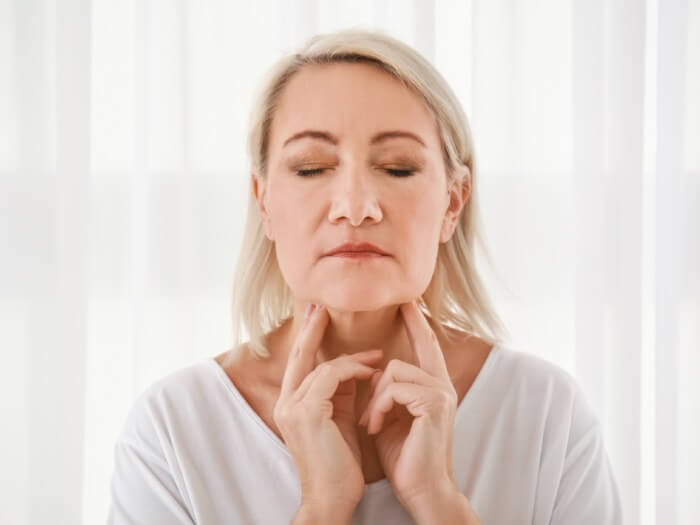As the beginning of perimenopause and menopause begin to change your body, it’s common to experience all sorts of uncomfortable symptoms. From hot flashes and mood swings to weight gain and fluctuations in energy levels, it’s normal to experience unpleasant side effects as your hormone levels adjust. One change many women don’t see coming may be one of the most disruptive to their day-to-day lives: sleep disturbances. This aspect of menopause impacts up to 63% of women but isn’t often talked about.
Menopause and Sleep Disturbances: Why You Might Not Be Sleeping Soundly Anymore
While not commonly discussed, problems surrounding restful sleep are common in perimenopause. During this time, your hormones change, leading to irregular periods and many other uncomfortable symptoms. Hot flashes can cause disturbances. When these happen at night or while you’re sleeping, they can wake you up or prevent you from falling asleep in the first place.
Reduced reproductive hormones, such as estrogen and progesterone, can also lead to sleep disorders. Studies show women who have already entered menopause are two to three times more likely to have sleep apnea, and it’s more likely to go undiagnosed. Many sleep disorders create symptoms such as fatigue that may be brushed off as a sign of aging rather than a symptom of something more.
Lifestyle Changes Can Support Restful Sleep
If you’ve been struggling to sleep, lifestyle changes may provide some relief. By making a series of alterations to your daily life, it’s possible to eliminate underlying causes of sleep disturbances, such as stress. If these changes don’t help, it may be time to speak with a medical professional about pursuing alternative treatment options or for a sleep evaluation.
Reduce Stress Levels With Yoga and Meditation
Stress is a major contributor to insomnia. It’s hard to sleep when your thoughts are racing. Yoga, meditation and similar techniques can help you turn to mindfulness to reduce stress levels and get some sleep. Try listening to guided meditations before sleeping or choosing some gentle yoga poses to implement as part of your nightly bedtime routine to reduce the tension in your body and mind.
Get Regular Exercise
Regular exercise can help improve sleep quality in multiple ways. While scientists don’t have the whole picture of how this works, it’s known that there’s an association between moderate aerobic exercise and increased slow-wave sleep, which is the type of sleep that allows your body to rest and rejuvenate. The key here is to make sure you exercise at the right time. Try implementing a workout two hours before bed, which allows the endorphins from exercise to fade before sleep. Plus, exercise elevates your core body temperature. As it starts to decline between 30 and 90 minutes later, you may notice you feel sleepier.
Keep a Regular Sleep Schedule
Keeping a regular sleep schedule helps your body to predict your natural rhythms. This means you should sleep and wake up at roughly the same time daily, even on weekends. Your body will begin to follow your internal clock, which may help you feel sleepier when it’s time to rest.
Skip Afternoon and Evening Naps
Napping in the afternoon or evening might feel like a great way to catch up on sleep, but it can prevent you from getting restful sleep later. While a short nap probably won’t hurt, longer ones can keep you awake at night.
Restful sleep is within reach
Cultivate a Calming Bedtime Routine
A calming bedtime routine can help prime your body to fall asleep quicker at night. Part of this is because you’ll train your internal clock to prepare for sleep, associating the routine with cues that it’s almost time to rest. This makes it easier to get a good night’s sleep. Try creating a routine that begins one to two hours before it’s time to sleep.
- Keep Your Room Bedtime-Ready: Make sure your bedroom is somewhere that will facilitate sleep. It should be cool, dark and comfortable. Try to keep screens out of this space, as their blue light suppresses melatonin and makes sleeping more difficult.
- Begin Winding Down an Hour Before Bedtime: At least an hour before bedtime, it’s time to turn off the screens and begin winding down. Make sure you aren’t snacking or exercising during this time.
- Take a Warm Bath: A warm bath as part of a bedtime routine can help when taken strategically. Take it 90 minutes before bed in water between 104 and 109 degrees Fahrenheit. You will naturally raise your body temperature in the bath, and as you get out, the drop in temperature will help encourage sleepiness.
- Read a Book: Whether you physically read a book or listen to an audiobook, having something to focus on can help reduce stress and encourage relaxation.
- Lights Out at The Same Time Each Night: The end of your bedtime routine should be making sure that you turn off the lights (which should be kept dim the hour before bed) at the same time each night.
Natural Supplements and Sleep Quality
Some people turn to natural sleep aids to help when nothing else seems to work. Since they tend to have fewer side effects than prescription medications, they’re common choices for those battling insomnia. Melatonin is known to be effective and should be taken between 30 and 60 minutes before bedtime. Other options for natural supplements include valerian root, magnesium, lavender, ginkgo biloba, glycine and passionflower. Before taking supplements, consult your primary physician to determine if it’s right for you.
Can Hormone Replacement Therapy Improve Sleep?
Sometimes, no matter how many lifestyle changes, routines or natural supplements you try, insomnia may persist. In these cases, it’s possible your sleep disturbances are caused by hormonal fluctuations associated with menopause. If you can’t find relief from your insomnia alone, don’t feel like you have to put up with it.
Speak to a medical professional, such as those at Hormonally Balanced, about hormone replacement therapy (HRT) as a potential solution. By restoring estrogen and, in some cases, supplementing with progesterone, some of the perimenopausal and post-menopausal symptoms contributing to insomnia can be alleviated. Women who receive HRT tend to sleep quicker, wake up in the night less often and experience better REM sleep.
Hormonally Balanced Can Help Restore Your Sleep
The all-female staff of practitioners at Hormonally Balanced is dedicated to helping women in the Greater Boston area stay healthy as they age. We specialize in helping women navigate and treat their midlife health concerns, especially those relating to hormones and weight management. If you’re struggling with poor sleep quality, there are solutions. Contact Hormonally Balanced to determine if you may be a candidate for HRT to help you sleep restfully again.



